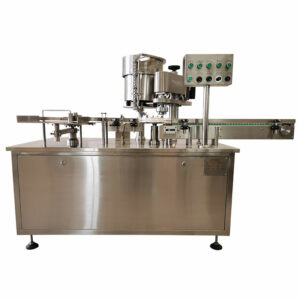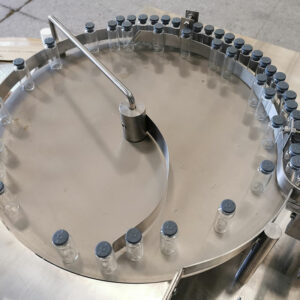Capping machinery can take on many different forms, usually based on the type of cap being used and the amount of automation necessary. When production demands to reach a certain level, automatic cappers almost become a necessity, but even for low to medium-production facilities, these packaging machines offer benefits.
1. Consistency, Reliability, Security
When the capping process is automated, one of the largest benefits is the repeatable action of the capping machine. As each cap and bottle are tightened in the same manner, the automated packaging equipment offers consistent, reliable, and secure sealing. Semi-automatic or manual capping will rely somewhat on manual labor, which will include factors such as fatigue, that can lead to inconsistent sealing and lost product. A well-maintained automatic machine will take care of such factors.
2. Speed
Automatic cappers can also offer an increase in the number of bottles or containers sealed during the production day. Hand capping, or even using semi-automatic bottle cappers, can take time, as each requires an operator to hand place a cap on the container before tightening the same. Automatic machinery includes a cap delivery system, leaving an operator to simply dump bulk caps into a hopper from time to time.
3. Versatility
Most automatic cappers can handle a wide range of cap types and sizes, as long as the tightening principle is the same. For example, spindle cappers are used to tighten screw-on caps. An automatic spindle capper, however, could handle flat caps, sports caps, flip tops, or even trigger sprayers. Different sizes of caps will generally just require some simple tool-free adjustments for changing over from one to another.
4. Ease of Operation
As noted above, once running, an operator will normally just need to re-supply bulk caps from time to time. The setup of the capping machine will include adjustments for the bottle and cap combination to be run. However, most of the time the adjustments will be made using a switch for height and simple hand knobs for capping components such as spindle wheels, gripper belts, conveyor rails, and similar aspects of the machine.
5. Integration
Finally, almost all automatic cappers can integrate easily with an existing packaging line. If power conveyors are being used, the machine can simply roll up to the existing line and, after set up, start running production. Absent conveyors, the automatic capper can be manufactured with its conveyor and be set up as the first step in automating a complete packaging line.
Whether part of a completely automated packaging system or a step toward the same, automatic cappers can increase efficiency and productivity for the entire packaging process.


